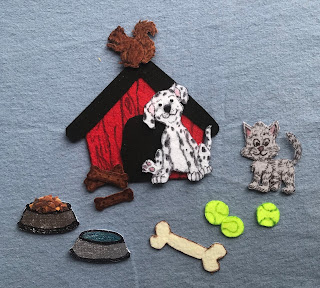Most of us know what a big hit the "Little Mouse" flannel game is, and if you're not familiar with it, you should be! I really like to ham it up and the kids absolutely love it and never get tired of it. But, we don't want to overuse it, and if you do themed storytimes it really only fits with themes like colors, hide-and-seek, or stories with mice. Over the last few years I have seen people come up with a lot of great variations on this game, and this is mine.
I wanted an activity to pair with Jan Thomas' book The Doghouse, and this immediately came to mind. This was a relatively quick and easy flannel, since I didn't do a lot of layered pieces, and just added a few quick details with colored sharpies. You can make houses in whatever colors you want, and use however many will fit on your flannel board. I chose to make all the primary and secondary colors, as well as pink and brown. I would not recommend white, as it is often see-thru.
So I hide the dog behind one of the houses, and one by one we look, saying the following rhyme before we check each house:
I wanted an activity to pair with Jan Thomas' book The Doghouse, and this immediately came to mind. This was a relatively quick and easy flannel, since I didn't do a lot of layered pieces, and just added a few quick details with colored sharpies. You can make houses in whatever colors you want, and use however many will fit on your flannel board. I chose to make all the primary and secondary colors, as well as pink and brown. I would not recommend white, as it is often see-thru.
So I hide the dog behind one of the houses, and one by one we look, saying the following rhyme before we check each house:
Little dog, little dog; come out and play!
What color house are you in today?
Are you in the _(color)_ house?

For more felt & flannel ideas and tips, check out the Flannel Friday Facebook group and Pinterest Boards! To share your flannel, submit via the Flannel Friday Tumblr. For complete information and all the details, visit the main Flannel Friday website.
There are a couple of different ways to play it. Sometimes I might just hide the dog randomly behind one of the houses, and let the kids take turns picking which color to check. Other times, I hide him in the very last house, but with another object in front of him. I also make a few other things to hide behind the remaining houses.
We check the houses in order, and I will really ham it up, taking a peak first, building suspense. So we find some of the dogs belongings, and a couple of friends, but not the dog. So when we get to the last house, the kids are sure he has to be there. But I carefully peel the house off, leaving the dog hidden behind the cat, with just his ears, paws, and/or tail peeking out. I will pretend like I don't see him, and have no idea where he could be. Eventually someone will spot him and tell me he's there, but I play dumb and continue to ham it up a bit before finally revealing our little pup.
Do you have a favorite variation on the "Little Mouse" game? I'd love to hear about it, and I'm sure others would as well, so tell us about in the comments and share a link!

For more felt & flannel ideas and tips, check out the Flannel Friday Facebook group and Pinterest Boards! To share your flannel, submit via the Flannel Friday Tumblr. For complete information and all the details, visit the main Flannel Friday website.






